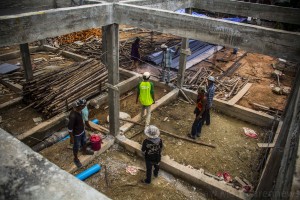The Migrant Worker Right Network (MWRN), has criticized the Burma and Thailand’s National Verification process for leaving migrant workers open to exploitation at the hands of corrupt brokers.
 It is estimated that in the last 30 years more than three million workers from Burma crossed borders illegally looking for better pay and to escape the poverty of their own country. Many of these workers have ended up working in Thailand.
It is estimated that in the last 30 years more than three million workers from Burma crossed borders illegally looking for better pay and to escape the poverty of their own country. Many of these workers have ended up working in Thailand.
Many of these workers are vulnerable to exploitation, abuse in the workplace and a lack of job security. The situation has been hampered by both the Burma and Thai government’s inability to deliver a clear migration policy framework even though a national verification process (NV) for migrant workers has been inplace for 11 years.
The National Verification Process
In 2002, the Burma and Thai Governments signed a bilateral agreement allowing regularisation of these workers through a National Verification (NV) process.
From 15 July 2009 these workers could apply for and receive temporary Myanmar passport and Thai visas via NV.
By August 2013, Myanmar statistics show that more than 1.7 million Myanmar workers received temporary passports for work in Thailand. Yet Thai statistics suggest less than 1 million are registered to work legally.
Brokers Hit Workers’ Pockets
In spite of the gradual rollout of the NV scheme, migrant workers are paying as much as five times what the process should legally cost due to broker charges.
Burma and Thailand agreed that migrant workers must pay 1,050 baht (US$3.3) to complete the NV process. Yet the Migrant Workers Right Network said that when broker charges and “under the table” costs are added up, each worker spent 5,500 to 12,000 baht (US$180-400) for getting a temporary passport and work permit.
With 1.7 million migrants completing the process this means brokers, agencies and officials through exploitation and corruption have already made at least 5,100 million baht (US$170 million) from the NV process. At the same time, low-income earning migrant workers have found themselves in “more debt, often leading to severe debt bondage, and seen their savings decline.” The MWRN said.
Since July 2013, migrant workers who passed the NV process in 2009 were not able to renew their visas with Thai immigration officials as the original 2002 MoU allowed workers to stay and work in Thailand for only four years prior to returning to their home country for at least three years.
Policy Black Hole
Both Thailand and Burma allowed this deadline to pass without creating a new and clear policy.
The MWRN said that as a result of “government incompetence in managing migration,” exploitation and extortion seriously spread as a direct result of this policy flaw.
Migrant workers whose legal documents expired or will soon expire continue to be unaware of their future and confused whether they can continue to live and work in Thailand legally or not.
MWRN said that as a result, workers already at high risk of labour right abuses, discrimination and exploitation are beginning to suffer more.
Misleading information continues to circulate among workers that they can no longer remain; or they have to return to Burma for one month or even one day, MWRN said. “Brokers are cheating 3,500 to 5,000 baht (US$120 – 170) from workers in promise for visa extensions, mostly in the Samut Sakorn, Nonthaburi, Chonburi and Bangkok areas of Thailand. Workers are being fined 500 baht (US$16) a day and up to a maximum of 20,000 Baht (US$700) for overstaying after fours years by Thai immigration officials.”
Representatives from both the Burma and Thai governments held two meetings on 5 September 2013 and 12 October 2013 to discuss issues of concern regarding the four-year migrant worker deadline.
Following these meetings, neither Government published easily digestible information for workers or employers on what to do once their four-year work permission had expired.



